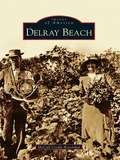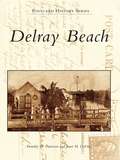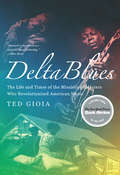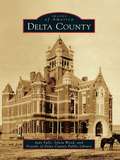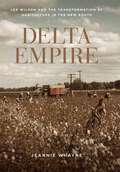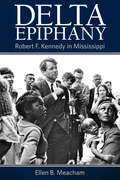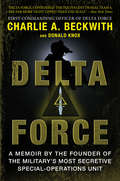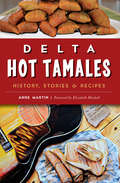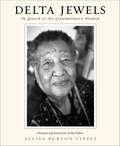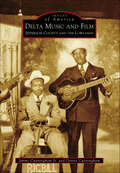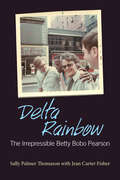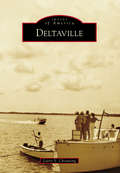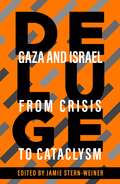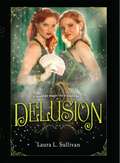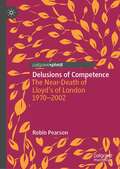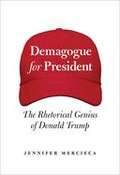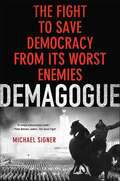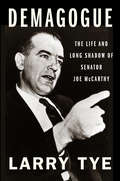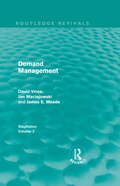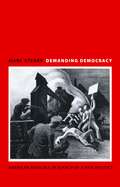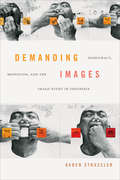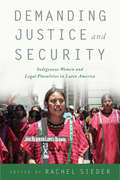- Table View
- List View
Delray Beach (Images of America)
by Mccall Credle-RosenthalDelray Beach lies on Florida's Atlantic coast, nestled between a sea grape-filled beach to the east and rich farmland to the west. Throughout its prosperous history, this "Village by the Sea," as it is often called, has maintained its mystical, quaint charm. The numerous stories of Delray Beach, kept alive through many of the town's elders, are rich depictions of the American experience. The importance of the past continues to reveal itself in the stories and images of the courageous pioneers who came from Michigan, the Bahamas, and nearby Southern states in the late 1800s.Early pioneers were attracted to Delray Beach for many of the same reasons that bring people there today. The history of Delray Beach is intrinsically linked to the community support of and appreciation for agriculture, art, and architecture. The area is known for fertile soil, diverse crops, and the large colony of artists that call their bungalows and cottages along the Delray beaches home. Thousands of visitors annually flock to attend the numerous festivals held in the city's historic downtown streets. In both 1993 and 2001, Delray Beach received the prestigious "All America City" award from the National Civic League.
Delray Beach (Postcard History Series)
by Janet Devries Dorothy PattersonTravel the roads and waterways of Delray Beach history through lovingly collected postcards. In the 1890s, a diverse group of settlers began gathering on the southeast coast of Florida to build a new community. These pioneers sought the freedom, adventure, and economic opportunity provided by the new Florida East Coast Railway. Delray's population was distinctive for its respect for education, early interest in the arts, love of sports, religious faith, and bonds of community. By the 1920s, the farming-fishing settlement had blossomed into a sparkling resort town with a thriving winter colony. This unfolding story of Delray Beach and the surrounding vicinity is presented from the Delray Beach Historical Society Archives and private collections.
Delta Blues: The Life and Times of the Mississippi Masters Who Revolutionized American Music
by Ted Gioia"The essential history of this distinctly American genre."--Atlanta Journal-Constitution In this "expertly researched, elegantly written, dispassionate yet thoughtful history" (Gary Giddins), award-winning author Ted Gioia gives us "the rare combination of a tome that is both deeply informative and enjoyable to read" (Publishers Weekly, starred review). From the field hollers of nineteenth-century plantations to Muddy Waters and B.B. King, Delta Blues delves into the uneasy mix of race and money at the point where traditional music became commercial and bluesmen found new audiences of thousands. Combining extensive fieldwork, archival research, interviews with living musicians, and first-person accounts with "his own calm, argument-closing incantations to draw a line through a century of Delta blues" (New York Times), this engrossing narrative is flavored with insightful and vivid musical descriptions that ensure "an understanding of not only the musicians, but the music itself" (Boston Sunday Globe). Rooted in the thick-as-tar Delta soil, Delta Blues is already "a contemporary classic in its field" (Jazz Review).
Delta County (Images of America)
by Sylvia Wood Judy Falls Friends of Delta County Public LibraryDuring the frenetic days of Reconstruction, Delta County claimed land between two branches of the Sulphur River, from Lamar and Hopkins Counties, and named itself after its shape and the third letter of the Greek alphabet. From its early days, Delta County became home to prosperous farmers who relocated from the South and who brought with them their knowledge of growing cotton as well as their traditions and cultures. At its heyday in the 1920s, the county boasted the densest rural population in the state. These pioneers believed strongly in education, and more than 40 schools dotted the county at one time, with many graduates of these rural schools becoming doctors, engineers, teachers, politicians, ministers, authors, musicians, lawyers, coaches, scientists, and athletes--as well as one All-American. For those who remained, those who returned, and those who chose this quiet corner of Northeast Texas, Delta County is home, with all the sweet and poignant implications of that word.
Delta Empire: Lee Wilson and the Transformation of Agriculture in the New South (Making the Modern South)
by Jeannie WhayneIn Delta Empire: Lee Wilson and the Transformation of Agriculture in the New South Jeannie Whayne employs the fascinating history of a powerful plantation owner in the Arkansas delta to recount the evolution of southern agriculture from the late nineteenth century through World War II. After his father's death in 1870, Robert E. "Lee" Wilson inherited 400 acres of land in Mississippi County, Arkansas. Over his lifetime, he transformed that inheritance into a 50,000-acre lumber operation and cotton plantation. Early on, Wilson saw an opportunity in the swampy local terrain, which sold for as little as fifty cents an acre, to satisfy an expanding national market for Arkansas forest reserves. He also led the fundamental transformation of the landscape, involving the drainage of tens of thousands of acres of land, in order to create the vast agricultural empire he envisioned. A consummate manager, Wilson employed the tenancy and sharecropping system to his advantage while earning a reputation for fair treatment of laborers, a reputation -- Whayne suggests -- not entirely deserved. He cultivated a cadre of relatives and employees from whom he expected absolute devotion. Leveraging every asset during his life and often deeply in debt, Wilson saved his company from bankruptcy several times, leaving it to the next generation to successfully steer the business through the challenges of the 1930s and World War II. Delta Empire traces the transition from the labor-intensive sharecropping and tenancy system to the capital-intensive neo-plantations of the post--World War II era to the portfolio plantation model. Through Wilson's story Whayne provides a compelling case study of strategic innovation and the changing economy of the South in the late nineteenth century.
Delta Epiphany: Robert F. Kennedy in Mississippi
by Ellen B. MeachamIn April 1967, a year before his run for president, Senator Robert F. Kennedy knelt in a crumbling shack in Mississippi trying to coax a response from a listless child. The toddler sat picking at dried rice and beans spilled over the dirt floor as Kennedy, former US attorney general and brother to a president, touched the boy's distended stomach and stroked his face and hair. After several minutes with little response, the senator walked out the back door, wiping away tears.In Delta Epiphany: Robert F. Kennedy in Mississippi, Ellen B. Meacham tells the story of Kennedy's visit to the Delta, while also examining the forces of history, economics, and politics that shaped the lives of the children he met in Mississippi in 1967 and the decades that followed. The book includes thirty-seven powerful photographs, a dozen published here for the first time. Kennedy's visit to the Mississippi Delta as part of a Senate subcommittee investigation of poverty programs lasted only a few hours, but Kennedy, the people he encountered, Mississippi, and the nation felt the impact of that journey for much longer. His visit and its aftermath crystallized many of the domestic issues that later moved Kennedy toward his candidacy for the presidency. Upon his return to Washington, Kennedy immediately began seeking ways to help the children he met on his visit; however, his efforts were frustrated by institutional obstacles and blocked by powerful men who were indifferent and, at times, hostile to the plight of poor black children.Sadly, we know what happened to Kennedy, but this book also introduces us to three of the children he met on his visit, including the baby on the floor, and finishes their stories. Kennedy talked about what he had seen in Mississippi for the remaining fourteen months of his life. His vision for America was shaped by the plight of the hungry children he encountered there.
Delta Force
by Charlie A. Beckwith Donald KnoxThe only insider′s account ever written on America′s most powerful weapon in the war against terrorism
Delta Hot Tamales: History, Stories & Recipes (American Palate)
by Anne W. Martin“A destination book filled with tales of intrigue and eccentricity . . . [about] a distinct strain of hot tamales born deep in the Mississippi Delta.” —Eat Y’allSeveral theories surround the traditional Delta tamale. Some trace it back to Mexican and Italian immigrants, while others say the Delta version of the hand-held meal is a spin on the old African American food called “cush.” One thing not disputed is the popularity. From hot tamale legends Joe Pope, Shine Thornton and the Scott family to current chefs, the traditions and the secret recipes live on. Writer and historian Anne Martin showcases the stories behind the traditional Delta hot tamale, as well as the countless variations of the delicacy found within the region.“Author Anne Martin explains in her new book about the Mississippi Delta’s own version of hot tamales and why they have remained a staple of Delta cuisine for generations . . . Even if you’ve never tasted ‘the Delta’s favorite food,’ Martin’s book will have you running for the nearest hot tamale stand.” —Today in Mississippi“Delta Hot Tamales: History, Stories & Recipes is not a traditional cookbook by any means. The book uses local food as a lens to explore the rich culture and history of an often misunderstood area in an often misunderstood state.” —Eat Y’all“Serves up a historical record and a thorough look at the current status of this distinctive culinary treat.” —Clarion Ledger
Delta Jewels: In Search of My Grandmother's Wisdom
by Alysia Burton SteeleInspired by memories of her beloved grandmother, photographer and author Alysia Burton Steele -- picture editor on a Pulitzer Prize-winning team -- combines heart-wrenching narrative with poignant photographs of more than 50 female church elders in the Mississippi Delta. These ordinary women lived extraordinary lives under the harshest conditions of the Jim Crow era and during the courageous changes of the Civil Rights Movement. With the help of local pastors, Steele recorded these living witnesses to history and folk ways, and shares the significance of being a Black woman -- child, daughter, sister, wife, mother, and grandmother in Mississippi -- a Jewel of the Delta. From the stand Mrs. Tennie Self took for her marriage to be acknowledged in the phone book, to the life-threatening sacrifice required to vote for the first time, these 50 inspiring portraits are the faces of love and triumph that will teach readers faith and courage in difficult times.
Delta Music and Film: Jefferson County and the Lowlands (Images of America)
by Donna Cunningham Jimmy Cunningham Jr.The Delta Lowlands, a place of stunning innovation and creativity in music and film, has laid an incredible foundation for American entertainment. Talented singers, producers, and musicians from a narrow stretch of Arkansas Delta land--traversing U.S. Highway 65 south near England down to Pine Bluff and on through Lake Village/Eudora--have garnered every conceivable distinction, including Grammys as well as Country Music Association (CMA), Gospel Music Association (GMA), Stellar, Dove, Soul Train, Rock and Roll Hall of Fame, and other music awards. The mosaic of cotton blossoms, catfish farms, blues juke joints, foot-stomping churches, and rich Delta dirt has also served as the training ground for legends in blues, R&B/soul, country music, jazz, and gospel. In film and television, the Delta Lowlands has birthed the invention of sound in movies, the development of slow-motion footage, the creation of television's Neilson's ratings, the first western-genre movie star, a cadre of Emmy and Oscar award-winning personalities, and a television tower that was once the second tallest man-made structure in the world.
Delta Rainbow: The Irrepressible Betty Bobo Pearson (Willie Morris Books in Memoir and Biography)
by Sally Palmer ThomasonBetty Bobo Pearson (b. 1922), a seventh-generation, plantation-born Mississippian, defied her cultural heritage—and caused great personal pain for her parents and herself—when she became an activist in the civil rights movement. Never fearing to break the mold in her search for the “best,” in her nineties she remains a strong, effective leader with a fun-loving, generous spirit. When Betty was eighteen months old, a train smashed into the car her mother was driving, killing Betty's beloved grandfather and severely injuring her grandmother. Thrown onto the engine's cow catcher, Betty lived and did not remember the accident. She did, however, grow up to fulfill her grandmother's prediction: “Betty, God reached down and plucked you from in front of that train because he has something very special he wants you to do with your life.” In 1943, twenty-one-year-old Betty, soon to graduate from the University of Mississippi, received a full-tuition scholarship to Columbia Graduate School in New York City. Ecstatic, she rushed home to tell her parents. “ABSOLUTELY NOT. There is no way I'll allow my daughter to live in Yankee Land,” her father replied. After fierce argument and much door slamming, Betty could not defy her father. But she had to show him she was her own person. Her nation was at war—so Betty joined the Marines. After the war, Betty married Bill Pearson and became mistress of Rainbow Plantation in the Delta. In 1955, she attended the Emmett Till trial (accompanied by her close friend and budding civil rights activist Florence Mars) and was shocked by the virulent degree of racism she witnessed there. Seeing her world in a new way, she became a courageous and dedicated supporter of the civil rights movement. Her activities severely fractured her close relationship with her parents. Yet, as a warm friend and bold, persuasive leader, Betty made an indelible mark in her church, in the Delta communities, in the lives of the people she employed, and in her beautiful garden at Rainbow.
Deltaville
by Larry S. ChowningIn the early 20th century, the communities previously recognized as Sandy Bottom, Enoch, Stingray Point, Ruark, Amburg, Stove Point, Horse Shoe Bend, Pace's Neck, and Grinels became part of what is known today as Deltaville. Strategically located between two major rivers and the Chesapeake Bay, Deltaville has been center stage to many events that have shaped the nation. During the Revolutionary War and the War of 1812, friend and foe visited its shores. Six decades later, both Union and Confederate blood was spilled on its ground. Throughout the early 20th century, Deltaville's shores played a large part in local industry. Common occupations included wooden boatbuilding, freighting, oystering, crabbing, and fishing. By the end of the century, the community had grown into a waterfront resort and served as a playground for recreational boaters and visitors.
Deluge: Gaza and Israel from Crisis to Cataclysm
by Jamie Stern-WeinerWhy did Hamas attack? What is Israel trying to achieve? Did this catastrophe have to happen? And is there a way forward? The book’s expert contributors address these and other questions, which have never been more urgent. In September 2023, US National Security Advisor Jake Sullivan boasted that the Middle East “is quieter today than it has been in two decades.” One week later, unprecedented violence in Gaza and Israel shattered the status quo and shocked the world. Hamas’s Operation Al-Aqsa Deluge punctured delusions of stability as hundreds of militants burst forth from the Gaza prison camp. In the ensuing carnage and firefights, 1,200 Israelis were killed and hundreds more taken hostage. Israel’s retaliation turned the besieged enclave into a howling wasteland. Nearly 30,000 people were killed in four months, including more than 12,000 children, and over 60 percent of homes were damaged or destroyed. Israel targeted the wounded and infirm, newborns and near-dead, as Gaza’s healthcare system—hospitals, clinics, ambulances, medical personnel—came under a systematic attack unprecedented in the annals of modern warfare. The Hamas massacre and the genocidal Israeli campaign which followed together mark a historic turning point in the Israel-Palestine conflict. The reverberations have also shaken politics far beyond, not least in Europe and the United States, where gigantic, round-the-clock protests for Palestinian rights pitted politicians against the public and exposed a growing statist authoritarianism. In this groundbreaking book—the first published about the 2023 Gaza war—leading Palestinian, Israeli, and international authorities put these momentous developments in context and provide an initial taking-stock. Contributors: Musa Abuhashhash, Ahmed Alnaouq, Nathan J. Brown, Yaniv Cogan, Clare Daly MEP, Talal Hangari, Khaled Hroub, R. J., Colter Louwerse, Mitchell Plitnick, Mouin Rabbani, Sara Roy, and Avi Shlaim
Delusion
by Ms Laura L. SullivanOpening-night jitters are nothing new for seventeen-year-old Phil and her sister Fee, who come from a centuries-old line of stage illusionists. The girls love to dazzle London audiences, but in the aftermath of the Blitz they're shipped off to the countryside, away from the bombs and Nazis. Phil, however, wants to fight for her country, and when she stumbles upon a hidden college of real magicians led by the devastatingly handsome Arden, all she wants to do is persuade them to help England win the war. She'll risk anything to give her country a fighting chance, even if it means losing her heart ...or her life.
Delusions and Grandeur: Dreamers of the New West
by Mark SundeenIn these new and selected essays, Mark Sundeen recounts two decades of political activism, outdoor exploration, and empathetic curiosity. He was both witness to and active participant in pivotal cultural and political events of the new millennium, from Howard Dean&’s presidential campaign to the Iraq War protests and the NoDAPL uprising in Standing Rock. But what brings these large phenomena into humanistic focus is the cast of idiosyncratic people he meets. Using first-person reportage, well-crafted storytelling, and wry, self-deprecating humor, Sundeen&’s keen observations illustrate what everyday life is like for people in the contemporary American West, with all their systemic precarities and individual triumphs.
Delusions of Competence: The Near-Death of Lloyd’s of London 1970--2002 (Palgrave Studies in Economic History)
by Robin PearsonThis book examines the crisis at the famous insurance market, Lloyd's of London, during the late twentieth century, which nearly destroyed the 300-year-old institution. While rapid structural change resulting from system collapse is less common in insurance than in the history of other financial services, one exception was the Lloyd’s crisis. Hitherto, explanations of the crisis have focused on the effects of catastrophic losses and poor governance. By drawing on contemporary accounts of the crisis, the author constructs the first comprehensive scholarly analysis of the public and political response. The book applies theoretical concepts from behavioural economics and economic psychology to argue that multiple delusions of competence were at work both within and outside the Lloyd’s market. Arrogance, elitism and defence of vested interests comprised endogenous elements of the crisis. Entrenched ideas about the virtues of self-regulation and faith in insider experts also played a role. The result was a misdiagnosis by both insiders and politicians of what ailed Lloyd’s and a series of reforms that failed to address the underlying causes of its disease. This book offers a salutary lesson from recent history about the importance of the transparency, accountability and effective monitoring of financial institutions. It is of interest to academics and students of economic and financial history, business, insurance, political economy and history.
Delville Wood: Somme (Battleground Europe)
by Nigel CaveAlmost every British regiment saw action in 'Devil's' Wood at some stage in the long Somme summer. This book examines some of the incidents and individuals who contributed to the history of the British Army and Delville Wood.
Demagogue For President: The Rhetorical Genius of Donald Trump
by Jennifer R. MerciecaHistoric levels of polarization, a disaffected and frustrated electorate, and widespread distrust of government, the news media, and traditional political leadership set the stage in 2016 for an unexpected, unlikely, and unprecedented presidential contest. Donald Trump's campaign speeches and other rhetoric seemed on the surface to be simplistic, repetitive, and disorganized to many. As Demagogue for President shows, Trump's campaign strategy was anything but simple. Political communication expert Jennifer Mercieca shows how the Trump campaign expertly used the common rhetorical techniques of a demagogue, a word with two contradictory definitions--"a leader who makes use of popular prejudices and false claims and promises in order to gain power" or "a leader championing the cause of the common people in ancient times" (Merriam-Webster, 2019). These strategies, in conjunction with post-rhetorical public relations techniques, were meant to appeal to a segment of an already distrustful electorate. It was an effective tactic. Mercieca analyzes rhetorical strategies such as argument ad hominem, argument ad baculum, argument ad populum, reification, paralipsis, and more to reveal a campaign that was morally repugnant to some but to others a brilliant appeal to American exceptionalism. By all accounts, it fundamentally changed the discourse of the American public sphere.
Demagogue: The Fight to Save Democracy from Its Worst Enemies
by Michael Signer“An intellectual lifeline for anyone who believes America should be on freedom’s side, and knows, in their heart, that there must be a better way.” —Peter Beinart, New York Times–bestselling authorA demagogue is a tyrant who owes his initial rise to the democratic support of the masses. Huey Long, Hugo Chavez, and Moqtada al-Sadr are all clear examples of this dangerous byproduct of democracy. Demagogue takes a long view of the fight to defend democracy from within, from the brutal general Cleon in ancient Athens, the demagogues who plagued the bloody French Revolution, George W. Bush’s naïve democratic experiment in Iraq, and beyond. This compelling narrative weaves stories about some of history’s most fascinating figures, including Adolf Hitler, Senator Joe McCarthy, and General Douglas Macarthur, and explains how humanity’s urge for liberty can give rise to dark forces that threaten that very freedom. To find the solution to democracy’s demagogue problem, the book delves into the stories of four great thinkers who all personally struggled with democracy—Plato, Alexis de Tocqueville, Leo Strauss, and Hannah Arendt.“Michael Signer’s erudite and eloquent defense of constitutional democracy against its demagogic counterfeit should be required reading for the citizens of established and emerging democracies alike.” —Michael Lind, author of The New Class War“An original foreign policy vision for the 21st century that puts democracy protection alongside democracy promotion. This is vital reading for anyone who cares about one of the great international challenges of the years ahead.” —Andrei Cherny, author of The Candy Bombers
Demagogue: The Life and Long Shadow of Senator Joe McCarthy
by Larry TyeThe definitive biography of the most dangerous demagogue in American history, based on first-ever review of his personal and professional papers, medical and military records, and recently unsealed transcripts of his closed-door Congressional hearings In the long history of American demagogues, from Huey Long to Donald Trump, never has one man caused so much damage in such a short time as Senator Joseph McCarthy. We still use &“McCarthyism&” to stand for outrageous charges of guilt by association, a weapon of polarizing slander. From 1950 to 1954, McCarthy destroyed many careers and even entire lives, whipping the nation into a frenzy of paranoia, accusation, loyalty oaths, and terror. When the public finally turned on him, he came crashing down, dying of alcoholism in 1957. Only now, through bestselling author Larry Tye&’s exclusive look at the senator&’s records, can the full story be told.Demagogue is a masterful portrait of a human being capable of immense evil, yet beguiling charm. McCarthy was a tireless worker and a genuine war hero. His ambitions knew few limits. Neither did his socializing, his drinking, nor his gambling. When he finally made it to the Senate, he flailed around in search of an agenda and angered many with his sharp elbows and lack of integrity. Finally, after three years, he hit upon anti-communism. By recklessly charging treason against everyone from George Marshall to much of the State Department, he became the most influential and controversial man in America. His chaotic, meteoric rise is a gripping and terrifying object lesson for us all. Yet his equally sudden fall from fame offers reason for hope that, given the rope, most American demagogues eventually hang themselves.
Demand Management: Stagflation - Volume 2 (Routledge Revivals: Stagflation #Vol. 02)
by David A Vines J. M. Maciejowski J. E. MeadeFirst published in 1983, this is the second of two volumes on the causes and cure of stagflation – that combination of mass unemployment and rapid inflation that is currently afflicting the mixed economies of the industrially developed world. The authors deplore the unemployment due to the failure of governments to adopt Keynesian measures for the expansion of economic activity, but recognise that in present conditions such measures would lead to an unacceptable and explosive inflation of money wages and prices. They therefore advocate a dual strategy of financial policies for a steady expansion of total money incomes combined with individual wage rates set at levels to promote employment. The book is of importance for all those concerned with macroeconomic theory and policy. The description of the meaning of a New Keynesian policy and of the arguments for it have been written in a way which should be intelligible to policy-makers and students, and not only to economists with technical training. Professional macroeconomists will be interested not only in these sections but also in the fully specified macroeconomic model used to analyse New Keynesian policies in economic terms and to carry out a counterfactual re-running of history. In addition, the unusually detailed exposition of the application of control techniques to a difficult multivariable control problem also makes the book of interest to control engineers who wish to acquaint themselves with recent generalisations of classical frequency response methods.
Demand the Impossible: One Lawyer's Pursuit Of Equal Justice For All
by Robert L. TsaiHow four Supreme Court cases in recent years—all argued and won by one indomitable lawyer—are central to the pursuit of equal justice in America. Stephen Bright emerged on the scene as a cause lawyer in the early decades of mass incarceration, when inflammatory politics and harsh changes to criminal justice policy were crashing down on the most vulnerable members of society. He dedicated his career to unleashing social change by representing clients that society had long ago discarded, and advocated for all to receive a fair trial. In Demand the Impossible, Robert L. Tsai traces Bright’s remarkable career to explore the legal ideas that were central to his relentless pursuit of equal justice. For nearly forty years, Bright led the Southern Center for Human Rights, a nonprofit that provided legal aid to incarcerated people and worked to improve conditions within the justice system. He argued four capital cases before the US Supreme Court—and won each one, despite facing an increasingly hostile bench. With each victory, he brought to light how the law itself had become corrupted by the country’s thirst for severe punishment, exposing prosecutorial misconduct, continuing racial inequality, inadequate safeguards for people with intellectual disabilities, and the shameful quality of legal representation for the poor. Organized around these four major Supreme Court cases, each narrated in vivid and dramatic detail, Tsai’s essential account explores the racism built into the criminal justice system and the incredible advancements one lawyer and his committed allies made for equal rights. An electrifying work of legal history, Demand the Impossible reveals how change can be won in even the most challenging times and how seemingly small victories can go on to have outsized effects.
Demanding Democracy: American Radicals in Search of a New Politics
by Marc StearsWhat today's political thinkers can learn from the radical democratic movements of twentieth-century AmericaThis is a major work of history and political theory that traces radical democratic thought in America across the twentieth century, seeking to recover ideas that could reenergize democratic activism today. The question of how citizens should behave as they struggle to create a more democratic society has haunted the United States throughout its history. Should citizens restrict themselves to patient persuasion or take to the streets and seek to impose change? Marc Stears argues that anyone who continues to wrestle with these questions could learn from the radical democratic tradition that was forged in the twentieth century by political activists, including progressives, trade unionists, civil rights campaigners, and members of the student New Left.These activists and their movements insisted that American campaigners for democratic change should be free to strike out in whatever ways they thought necessary, so long as their actions enhanced the political virtues of citizens and contributed to the eventual triumph of the democratic cause. Reevaluating the moral and strategic arguments, and the triumphs and excesses, of this radical democratic tradition, Stears contends that it still offers a compelling account of citizen behavior—one that is fairer, more inclusive, and more truly democratic than those advanced by political theorists today.
Demanding Images: Democracy, Mediation, and the Image-Event in Indonesia
by Karen StrasslerThe end of authoritarian rule in 1998 ushered in an exhilarating but unsettled period of democratization in Indonesia. A more open political climate converged with a rapidly changing media landscape, yielding a vibrant and volatile public sphere within which Indonesians grappled with the possibilities and limits of democracy amid entrenched corruption, state violence, and rising forms of intolerance. In Demanding Images Karen Strassler theorizes image-events as political processes in which publicly circulating images become the material ground of struggles over the nation's past, present, and future. Considering photographs, posters, contemporary art, graffiti, selfies, memes, and other visual media, she argues that people increasingly engage with politics through acts of making, circulating, manipulating, and scrutinizing images. Demanding Images is both a closely observed account of Indonesia's turbulent democratic transition and a globally salient analysis of the work of images in the era of digital media and neoliberal democracy. Strassler reveals politics today to be an unruly enterprise profoundly shaped by the affective and evidentiary force of images.
Demanding Justice and Security: Indigenous Women and Legal Pluralities in Latin America
by Morna Macleod Adriana Terven Salinas Ana Cecilia Bohrt Cristina Cucuri Emma Cervone Leonor Lozano Mariana Mora Natalia De Marinis Professor Maria Teresa Sierra Professor Rosalva Aida Castillo Rachel SiederAcross Latin America, indigenous women are organizing to challenge racial, gender, and class discrimination through the courts. Collectively, by engaging with various forms of law, they are forging new definitions of what justice and security mean within their own contexts and struggles. They have challenged racism and the exclusion of indigenous people in national reforms, but also have challenged ‘bad customs’ and gender ideologies that exclude women within their own communities. Featuring chapters on Bolivia, Colombia, Ecuador, Guatemala, and Mexico, the contributors to Demanding Justice and Security include both leading researchers and community activists. From Kichwa women in Ecuador lobbying for the inclusion of specific clauses in the national constitution that guarantee their rights to equality and protection within indigenous community law, to Me’phaa women from Guerrero, Mexico, battling to secure justice within the Inter-American Court of Human Rights for violations committed in the context of militarizing their home state, this book is a must-have for anyone who wants to understand the struggle of indigenous women in Latin America.
